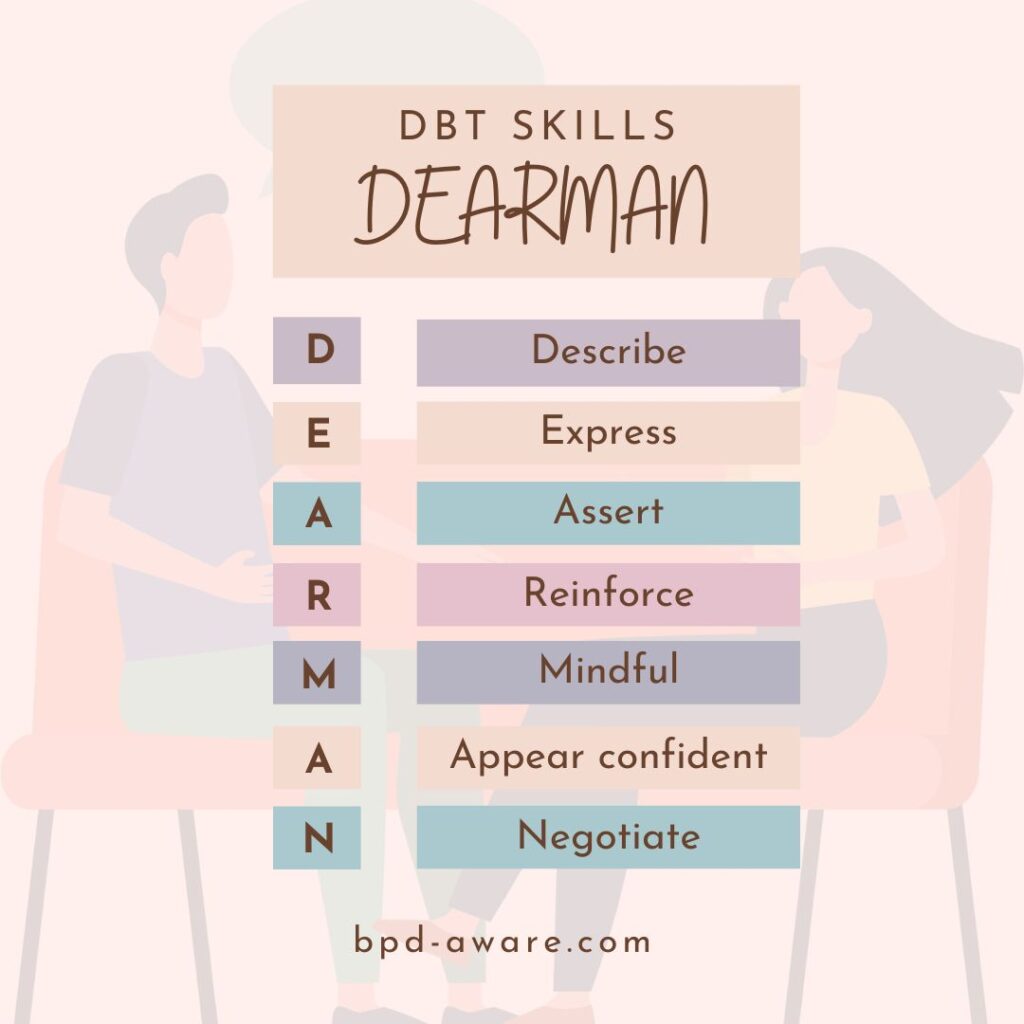One of the key skills taught in Dialectical Behavior Therapy (DBT) is DEARMAN, an acronym that stands for Describe, Express, Assert, Reinforce, Mindful, Appear confident, and Negotiate. This skill is designed to help individuals communicate effectively and assertively, improving interpersonal relationships and managing conflicts.
For people with Borderline Personality Disorder, DEARMAN can be a transformative skill. It aids in:
Improving Communication: It offers a structured approach to expressing needs and desires clearly and effectively. Improving communication is crucial for individuals with BPD because it directly impacts their ability to form and maintain healthy relationships, reducing misunderstandings and conflicts. Effective communication skills help in expressing emotions, needs, and boundaries more clearly, leading to increased emotional stability and better interpersonal interactions, which are often challenging areas for those with BPD.
Enhancing Relationships: By communicating assertively and respectfully, individuals can strengthen their relationships and reduce conflicts.
Building Confidence: Successfully asserting oneself can boost self-esteem and confidence. Building confidence is vital for individuals with BPD as it empowers them to trust their own decisions and value their self-worth, reducing feelings of insecurity and dependency on others for validation. Increased confidence also enhances their ability to navigate social interactions and confront challenges with resilience, contributing to more stable and fulfilling relationships.
Managing Emotions: The process encourages emotional regulation, helping individuals respond to situations calmly and effectively. Learning to manage emotions is crucial for people with BPD because it helps in reducing the intensity and frequency of emotional swings, which are characteristic of the disorder. This skill fosters greater emotional stability, improves relationships, and enhances the individual’s ability to cope with stress, leading to a more balanced and satisfying life.

Understanding DEARMAN
DEARMAN is a crucial component of Dialectical Behavior Therapy that equips individuals with a structured method to communicate effectively, especially when their emotions are intense. This skill is invaluable for those with Borderline Personality Disorder, as it aids in navigating the often tumultuous waters of their interpersonal relationships. By breaking down communication into manageable steps, DEARMAN offers a clear roadmap for expressing needs, setting boundaries, and resolving conflicts.
- Describe: Begin by objectively stating the facts of the situation. This foundation sets a neutral tone for the conversation, making it easier for the other person to understand your perspective without feeling attacked.
- Express: Sharing your feelings and how the situation affects you encourages emotional honesty. It’s important to take ownership of your emotions rather than implying that they are caused by someone else.
- Assert: Being clear and direct about what you want or don’t want is crucial. Assertiveness here means respecting both your own needs and the other person’s ability to respond or negotiate.
- Reinforce: Explaining the positive outcomes or benefits that will result from your request can motivate the other person to consider it more seriously. It shows that there’s something in it for them too.
- Mindful: Staying focused on your objectives helps to avoid getting sidetracked by irrelevant issues or emotional reactions. This might require resisting the urge to respond to provocations or distractions.
- Appear Confident: Your body language and tone convey a lot about your confidence in what you’re saying. Confidence here doesn’t mean being domineering but rather conveying that you believe in the validity of your request.
- Negotiate: Flexibility and a willingness to find a middle ground are signs of maturity and respect for the other person’s needs and limitations. Negotiation can lead to solutions that work well for both parties.
To practice DEARMAN, you can start by writing down scenarios where you need to assert yourself. Outline what you will say for each step of the DEARMAN acronym. Role-playing with a therapist or trusted friend can also be beneficial. The key is to practice repeatedly to become comfortable with assertive communication.
You can use the following examples as a starting point:
Examples of DEARMAN in Action
Requesting Support
- Describe: “During the weekly meetings, I’ve noticed that my points are often overlooked.”
- Express: “This makes me feel undervalued and ignored.”
- Assert: “I would appreciate it if I could have a dedicated time to present my ideas.”
- Reinforce: “This would not only help me convey my contributions more effectively but also enhance our team’s collaboration.”
- Mindful: Keep steering the conversation back to your request if it goes off track.
- Appear Confident: Speak clearly and maintain steady eye contact.
- Negotiate: “If time is limited, I’m willing to summarize my points more concisely.”
Addressing a Work Deadline
- Describe: “The deadline for the project is set for the end of this week.”
- Express: “I’m concerned about meeting this deadline without compromising the quality of our work.”
- Assert: “I propose we request a two-day extension.”
- Reinforce: “This additional time will allow us to refine our work and ensure it meets the high standards expected.”
- Mindful: Stay focused on the request for an extension, even if the conversation shifts to the workload.
- Appear Confident: Use a tone that conveys your conviction in the necessity of the extension.
- Negotiate: “If an extension is not feasible, could we prioritize certain aspects of the project to ensure critical areas are completed on time?”
Addressing Unwanted Behavior
- Describe: “I’ve noticed that you often borrow my things without asking.”
- Express: “This makes me feel disrespected and anxious about my belongings.”
- Assert: “I need you to ask for my permission before using my things.”
- Reinforce: “This will help me trust you more and feel more comfortable sharing my space with you.”
- Mindful: Do not deviate from your point, even if they try to justify their behavior.
- Appear Confident: Stand or sit in a way that shows you are serious about your request.
- Negotiate: “If there’s something you urgently need, let’s discuss how we can accommodate that without overstepping boundaries.”
Declining an Invitation
- Describe: “I received your invitation to the event this Friday.”
- Express: “I’m happy that you thought of me and appreciate the invite.”
- Assert: “However, I need to decline as I have prior commitments that evening.”
- Reinforce: “By letting you know now, I hope it gives you enough time to find someone else who can attend.”
- Mindful: If they express disappointment or try to persuade you, gently reiterate your commitment.
- Appear Confident: Keep your tone polite but firm, showing that your decision is final.
- Negotiate: “I would love to catch up another time. Maybe we can schedule a lunch next week?”
These examples showcase how DEARMAN can be applied across a range of situations, from personal interactions to professional settings. The key is to practice regularly so that these steps become a natural part of how you communicate when you need to be clear, assertive, and effective in conveying your needs or setting boundaries.

Final Thoughts
The DEARMAN technique is a powerful tool for individuals with BPD to enhance their communication skills, assert their needs, and improve their relationships. Offering a structured approach to difficult conversations helps reduce the emotional volatility often associated with BPD. Practicing DEARMAN can lead to more positive interactions, increased self-respect, and a greater sense of control over one’s life.
Incorporating DEARMAN into daily interactions requires practice and patience. It’s not just about using it in high-stakes situations but also in everyday conversations. Over time, these skills can become more natural, leading to more meaningful and satisfying relationships. For those with BPD, mastering DEARMAN is a step towards building a life that feels more manageable and fulfilling, marked by healthier communication and stronger connections with others.
Sources, Resources, and Further Reading
- DEAR MAN DBT Skill: The Most Effective Way to Make a Request: https://sunrisertc.com/dear-man/
- Ask! 28 Ideas for Practicing the DEAR MAN Skill: https://www.hopeforbpd.com/borderline-personality-disorder-treatment/dbt-dear-man-ideas
- How to Use the DBT Skill “DEARMAN” to Say No and Express Your Needs in Relationships: https://wellviewcounseling.com/dbt-dearman-boundaries-relationship/
















